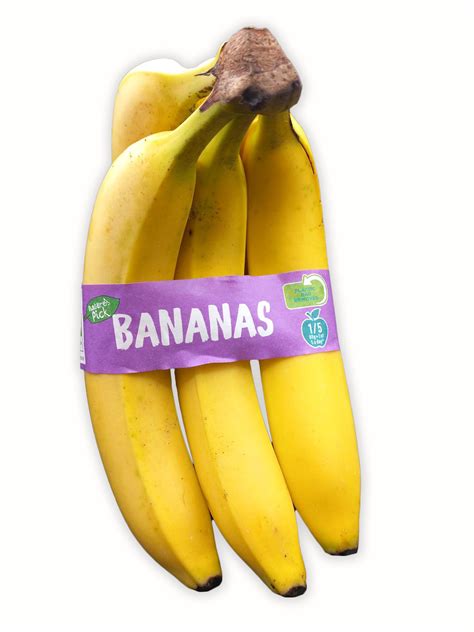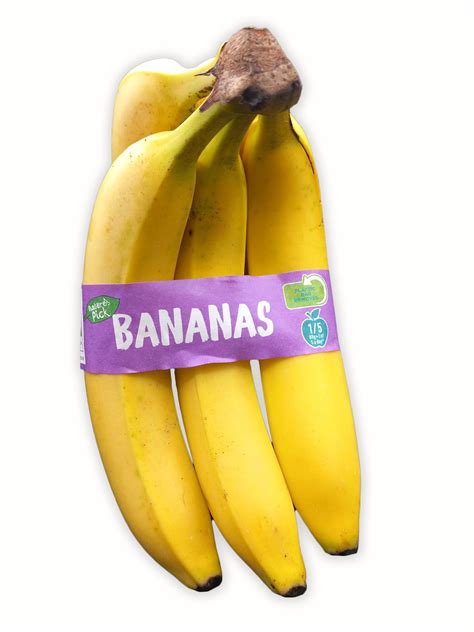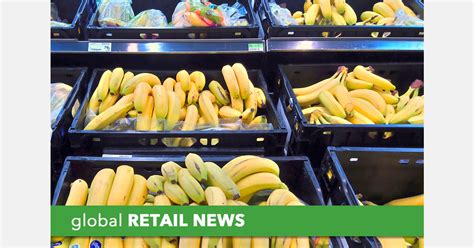
Aldi, the popular discount supermarket chain, is facing scrutiny as some shoppers express concerns over the quality and consistency of its bananas, leading to potential shifts in purchasing habits.
Reports from online forums and social media suggest that a segment of Aldi customers are experiencing issues with the fruit’s rapid ripening, bruising, and overall appearance, prompting them to consider alternative retailers for their banana purchases. This situation poses a challenge for Aldi, which has built a reputation on offering affordable groceries, including fresh produce, and maintaining customer satisfaction is crucial for its continued success. The complaints primarily revolve around the bananas ripening too quickly after purchase, sometimes within a day or two, and exhibiting excessive bruising or discoloration.
The issue has gained traction on platforms like Reddit, where Aldi shoppers have shared their experiences and opinions on the banana quality. For instance, one user on Reddit stated, “The bananas from Aldi go from green to brown in approximately 24 hours. Is it just me?” This sentiment is echoed by numerous other customers who have noticed a similar trend. This widespread feedback indicates that the problem isn’t isolated and is affecting shoppers across different locations. “It’s not always a bad bunch, but it’s frequent enough that I’ve started buying my bananas elsewhere,” another customer reported.
Several factors might contribute to these reported issues. One potential explanation is the handling and transportation of bananas from their origin to the store shelves. Bananas are highly susceptible to temperature fluctuations and physical damage, both of which can accelerate the ripening process and cause bruising. According to produce industry experts, maintaining a consistent temperature throughout the supply chain is essential for preserving banana quality. Any disruptions or mishandling during transportation could compromise the fruit’s condition.
Another possible factor is the ethylene gas exposure, which naturally ripens bananas. While ethylene is used to control the ripening process, overexposure can lead to premature ripening and spoilage. Aldi, like other retailers, relies on a complex supply chain to ensure a steady supply of bananas. The efficiency and effectiveness of this supply chain directly impact the quality of the fruit that reaches the consumers.
Aldi has yet to issue an official statement addressing the banana quality concerns directly. However, the company is known for its commitment to customer satisfaction, and it’s likely that they are aware of the feedback and are taking steps to investigate and address the issue. Aldi’s business model is based on offering high-quality products at competitive prices, and maintaining this balance is essential for retaining customers.
In the meantime, shoppers are left to weigh the cost savings of buying bananas at Aldi against the potential risk of receiving fruit that doesn’t meet their expectations. Many customers are resorting to strategies like purchasing green bananas in smaller quantities or opting for bananas from other grocery stores. The long-term impact of these quality concerns on Aldi’s banana sales remains to be seen, but it underscores the importance of consistent quality control in the fresh produce section. The situation serves as a reminder that even a seemingly minor issue with a staple item like bananas can have a significant impact on customer perception and loyalty.
Customer Experiences and Social Media Buzz
The anecdotal evidence shared by Aldi customers across various online platforms paints a consistent picture of dissatisfaction. On Reddit, multiple threads are dedicated to discussing the perceived decline in banana quality. Users frequently post photos of bruised or overly ripe bananas purchased from Aldi, accompanied by comments expressing their frustration. The consensus among many shoppers is that the bananas ripen too quickly, often becoming unusable within a short period.
This negative feedback isn’t limited to Reddit. Similar complaints can be found on other social media platforms, such as Facebook and Twitter, where customers share their experiences and warn others about the potential quality issues. The hashtag #AldiBananas has even emerged as a way for shoppers to track and discuss the topic. The prevalence of these online discussions indicates that the issue is widespread and has captured the attention of a significant number of Aldi customers.
Some customers have reported attempting to address the issue with Aldi’s customer service, but the responses have been mixed. While some have received refunds or replacements, others have expressed disappointment with the lack of a comprehensive solution. This inconsistency in customer service experiences further contributes to the overall dissatisfaction with Aldi’s bananas. The power of social media in amplifying customer complaints cannot be understated. In today’s digital age, negative feedback can spread rapidly and damage a company’s reputation, especially when it involves a widely consumed product like bananas.
Potential Causes for Banana Quality Issues
Several factors could be contributing to the reported decline in banana quality at Aldi. These factors can be broadly categorized into issues related to supply chain management, handling practices, and storage conditions.
-
Supply Chain Management: The journey of a banana from the plantation to the store shelf is a complex and delicate process. Any disruptions or inefficiencies in the supply chain can negatively impact the fruit’s quality. Aldi sources its bananas from various suppliers, and the quality control measures implemented by these suppliers may vary. Inconsistent quality standards among suppliers could lead to variations in the quality of bananas sold at Aldi stores. The transportation of bananas involves multiple stages, including shipping, trucking, and warehousing. During each of these stages, the bananas are susceptible to temperature fluctuations and physical damage. Maintaining a consistent temperature throughout the supply chain is crucial for preventing premature ripening and spoilage. Inadequate temperature control during transportation can expose the bananas to excessive heat or cold, accelerating the ripening process and causing bruising. The time it takes for bananas to travel from the source to the store is another critical factor. Longer transit times increase the risk of spoilage and reduce the shelf life of the fruit. Delays in transportation can also expose the bananas to unfavorable conditions, such as high humidity or exposure to ethylene gas from other ripening fruits.
-
Handling Practices: The way bananas are handled at the store level can also impact their quality. Improper handling can cause bruising and damage to the fruit, making it more susceptible to spoilage. Aldi employees are responsible for unloading, sorting, and displaying bananas in the produce section. If these tasks are not performed carefully, it can lead to physical damage to the fruit. Stacking bananas too high or dropping them during handling can cause bruising and internal damage. Exposure to ethylene gas, which is naturally produced by ripening fruits, can accelerate the ripening process of bananas. If bananas are stored near other fruits that produce high levels of ethylene, such as apples or avocados, they may ripen prematurely. Proper ventilation in the produce section is essential for preventing the buildup of ethylene gas.
-
Storage Conditions: The storage conditions at Aldi stores can also influence banana quality. Maintaining the correct temperature and humidity levels is crucial for preserving the fruit’s freshness. Bananas should be stored at a temperature between 56°F and 58°F (13°C and 14°C) to slow down the ripening process. Storing bananas at temperatures outside this range can accelerate ripening or cause chilling injury. High humidity levels can promote mold growth and spoilage, while low humidity levels can cause the bananas to dry out and shrivel. Proper air circulation in the storage area is essential for maintaining consistent temperature and humidity levels.
Expert Opinions and Industry Standards
To gain a deeper understanding of the factors influencing banana quality, it’s helpful to consult with produce industry experts and examine industry standards for banana handling and storage.
According to the Produce Marketing Association (PMA), a leading trade organization representing the fresh produce industry, maintaining a consistent cold chain is essential for preserving the quality of bananas. The cold chain refers to the continuous refrigeration of produce from the time it is harvested until it reaches the consumer. Disruptions in the cold chain can lead to temperature fluctuations, which can negatively impact the quality of bananas.
The PMA recommends that bananas be transported and stored at a temperature between 56°F and 58°F (13°C and 14°C). This temperature range slows down the ripening process and helps to prevent chilling injury. Chilling injury occurs when bananas are exposed to temperatures below 56°F (13°C), causing the fruit to turn brown and develop a mushy texture.
In addition to temperature control, proper humidity levels are also important for preserving banana quality. The PMA recommends that bananas be stored at a humidity level of 85% to 95%. This humidity range helps to prevent the bananas from drying out and shriveling. Proper ventilation is also essential for maintaining consistent temperature and humidity levels in the storage area. The PMA recommends that bananas be stored in a well-ventilated area to prevent the buildup of ethylene gas.
Industry experts also emphasize the importance of gentle handling practices. Bananas are delicate fruits that can be easily bruised or damaged if handled improperly. The PMA recommends that bananas be handled with care and that they not be dropped or stacked too high.
Aldi’s Response and Potential Solutions
While Aldi has not yet issued an official statement addressing the banana quality concerns directly, there are several steps the company could take to address the issue and improve customer satisfaction.
-
Supplier Audits: Aldi could conduct thorough audits of its banana suppliers to ensure that they are adhering to industry best practices for quality control. These audits could include inspections of the suppliers’ growing, harvesting, and handling practices. Aldi could also require its suppliers to implement stricter quality control measures, such as regular temperature monitoring and ethylene gas management.
-
Supply Chain Optimization: Aldi could work to optimize its banana supply chain to reduce transit times and minimize the risk of temperature fluctuations. This could involve using faster transportation methods, such as air freight, or establishing regional distribution centers to shorten the distance that bananas need to travel. Aldi could also invest in temperature-controlled trucks and warehouses to ensure that bananas are kept at the proper temperature throughout the supply chain.
-
Improved Handling Practices: Aldi could implement stricter handling practices at its stores to minimize the risk of bruising and damage to bananas. This could involve training employees on proper banana handling techniques and providing them with the necessary equipment, such as padded gloves and carts. Aldi could also implement a system for rotating banana displays to ensure that the oldest bananas are sold first.
-
Customer Feedback Mechanism: Aldi could establish a customer feedback mechanism to gather information about banana quality and identify areas for improvement. This could involve creating an online survey or a dedicated email address for customers to submit their feedback. Aldi could also use social media monitoring tools to track customer comments and complaints about banana quality.
-
Transparency and Communication: Aldi could improve its transparency and communication with customers regarding banana quality. This could involve providing information on the origin of its bananas, the handling practices used, and the steps it is taking to address quality concerns. Aldi could also respond to customer inquiries and complaints in a timely and professional manner.
Impact on Aldi’s Brand and Customer Loyalty
The ongoing concerns about banana quality at Aldi could have a negative impact on the company’s brand and customer loyalty. Aldi has built a reputation for offering high-quality products at low prices. If customers perceive that the quality of Aldi’s bananas is declining, they may be less likely to shop at the store.
A survey conducted by a consumer research firm found that 75% of shoppers said that product quality is the most important factor when deciding where to buy groceries. If Aldi fails to address the banana quality issues, it could lose customers to its competitors. The potential impact on customer loyalty is particularly concerning for Aldi, which relies on repeat business to drive its growth. A study by Bain & Company found that a 5% increase in customer retention can increase profits by 25% to 95%.
Alternative Options for Shoppers
In light of the banana quality concerns at Aldi, shoppers may want to consider alternative options for purchasing this popular fruit.
-
Other Grocery Stores: Many other grocery stores offer bananas, and some may have stricter quality control measures than Aldi. Shoppers can compare the appearance and price of bananas at different stores to find the best option.
-
Farmers Markets: Farmers markets often offer locally grown produce, which may be fresher and of higher quality than bananas sold at grocery stores.
-
Specialty Produce Stores: Specialty produce stores typically focus on offering high-quality fruits and vegetables, and they may have more stringent quality control measures than traditional grocery stores.
Conclusion
The recent reports of declining banana quality at Aldi highlight the challenges of maintaining consistent quality in the fresh produce supply chain. While Aldi has yet to officially address the issue, the company is likely aware of the customer feedback and is taking steps to investigate and address the concerns. In the meantime, shoppers are left to weigh the cost savings of buying bananas at Aldi against the potential risk of receiving fruit that doesn’t meet their expectations. The situation serves as a reminder that even a seemingly minor issue with a staple item like bananas can have a significant impact on customer perception and loyalty. By implementing stricter quality control measures, optimizing its supply chain, and improving communication with customers, Aldi can work to restore confidence in its banana quality and maintain its reputation as a reliable provider of affordable groceries.
Frequently Asked Questions (FAQ)
- Why are Aldi banana customers complaining about the quality?
- Customers are reporting that Aldi bananas ripen too quickly, often within a day or two of purchase, and exhibit excessive bruising or discoloration. This has led to dissatisfaction and a consideration of alternative retailers for banana purchases.
- What are the potential causes of the banana quality issues at Aldi?
- Potential causes include disruptions in the supply chain, inadequate temperature control during transportation and storage, improper handling practices at the store level, and overexposure to ethylene gas, which accelerates ripening.
- Has Aldi issued a statement regarding the banana quality concerns?
- As of the latest reports, Aldi has not issued an official statement addressing the banana quality concerns directly. However, they are likely aware of the feedback and may be taking steps to investigate and address the issue.
- What can Aldi do to improve the quality of its bananas?
- Aldi could conduct thorough audits of its banana suppliers, optimize its supply chain to reduce transit times and temperature fluctuations, implement stricter handling practices at its stores, establish a customer feedback mechanism, and improve its transparency and communication with customers.
- What alternative options do shoppers have if they are not satisfied with Aldi bananas?
- Shoppers can consider purchasing bananas from other grocery stores, farmers markets, or specialty produce stores that may have stricter quality control measures. They can also adjust their purchasing habits by buying green bananas in smaller quantities to avoid spoilage.









